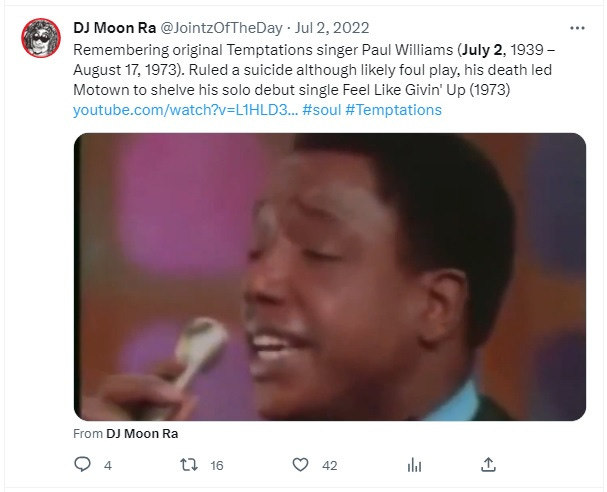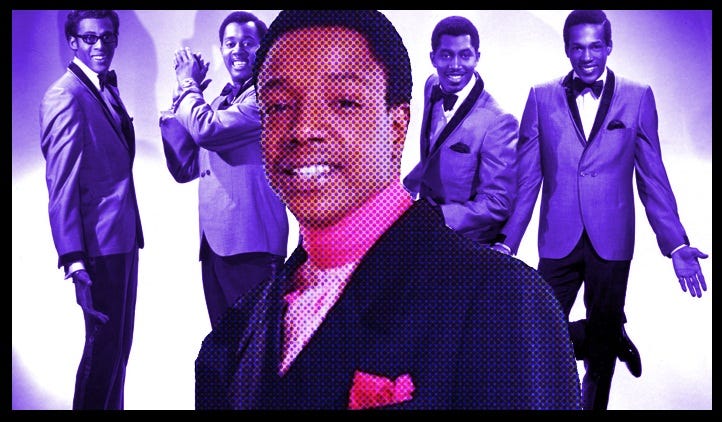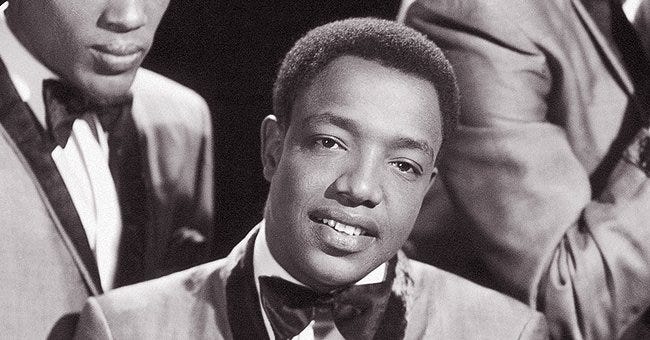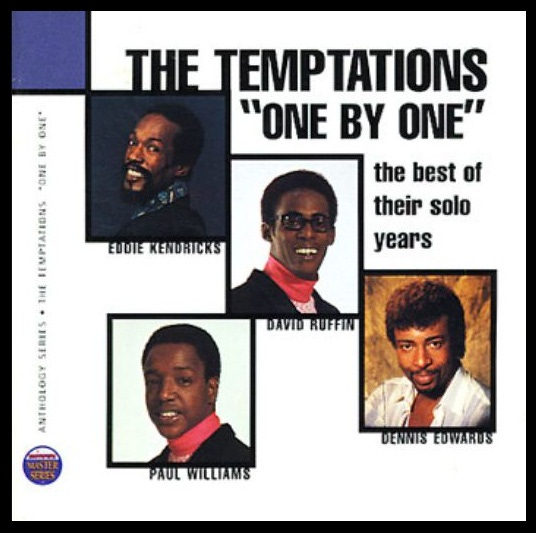Paul Williams (July 2, 1939 – August 17, 1973) – Feel Like Givin' Up (1973)
Co-written & produced by Eddie Kendricks, this was supposed to be original Temptations lead singer Williams' solo debut but was shelved after his tragic death.
Watch full video on Twitter.
View most updated version of this post on Substack.
Paul Williams was one of the founding members of the Temptations and the group’s original lead singer. After leaving the group in 1971 due to declining health, he started work on a planned solo album but was found dead in 1973. Although ruled a suicide, his death was likely foul play.
Born and raised in Birmingham, Alabama, Williams and Eddie Kendricks met each other in elementary school, apparently when the two boys started a fistfight after Williams dumped a bucket full of mop water on Kendricks’ head. They later became friends while singing in their church choir.
As teenagers, they joined a vocal group with two other friends called The Cavaliers, later re-named The Primes. In 1957, Williams, Kendricks and fellow Primes member Kell Osborne moved from Birmingham to Cleveland, Ohio. The trio found a manager who brought them to Detroit, where they performed around town and created a sister group called the Primettes, who would eventually become The Supremes.
The Primes broke up in 1960 when Osborne moved to California. Later that year, Williams and Kendricks heard Otis Williams had two openings in his rival Detroit vocal group The Distants. They joined Williams, Melvin “Blue” Franklin, and Elbridge “Al” Bryant to form the Elgins. In March, 1961, the new lineup signed with Berry Gordy Jr.’s recently incorporated label Motown Records after again changing their name to the Temptations.
Williams became the group’s main lead singer during their early years. He sang lead on records including their debut single “Oh, Mother of Mine” (1961), “Slow Down Heart” (1962), and “I Want A Love I Can See” (1963), their first A-side to be written and produced by Smokey Robinson. He was also the group’s best dancer, and initially served as the choreographer for both the Temptations and the Supremes, before Motown hired Cholly Atkins as the label’s in house choreographer.
When Bryant was fired from the group in 1963 and David Ruffin joined as his replacement, Ruffin eclipsed Williams as the group’s lead singer. After complaining to Robinson, by now the group’s main producer, that “Shit, y’know, I can sing too,” he was given the lead on “Don’t Look Back” (1965). Co-written by Robinson and Ronald White, who together had also co-written the Tempts’ mega-hit “My Girl,” it became Williams’ signature song and the closing number for the Temptations’ live performances. They memorably performed the song live on The Ed Sullivan Show.
See our posts on David Ruffin, producer Norman Whitfield, and Melvin "Blue" Franklin for more on the Temptations’ career.
In the late sixties, Williams began experiencing health problems, initially from sickle cell anemia and later due to alcoholism. Depressed that he was no longer the group’s lead singer or choreographer, he started drinking and smoking heavily while on the road. His performances suffered, leading to the other Tempts trying to raid or pour out his stashes of booze. They kept oxygen tanks backstage and eventually hired Richard Street, who had previously been the Distants’ lead singer, to sing Williams’ parts from behind a curtain except for his signature leads on songs like “Don’t Look Back.” Williams’ microphone was secretly turned off during most of their shows.
Once Williams was finally persuaded to see a doctor, a spot was discovered on his liver in April, 1971 and he quite the group, with Street named as his replacement. He was paid his regular 1/5 share of the Temptations’ royalties and received a salary as an advisor and choreographer for the next two years.
After his retirement, Williams quit drinking and smoking, and his health improved. He wanted to record a solo album, and enlisted his childhood friend Eddie Kendricks to produce it. Kendricks himself had left the Temptations in late 1970, a few months before Williams did.
In January, 1972, Williams sat in on a recording session Kendricks was producing for a group of his proteges called The Posse, featuring Ricky Langston on lead vocals. They were recording a song Kendricks had co-written, “Feel Like Givin’ Up,” and their single was released the next month. Williams wanted to record the song too, and in September of that year got the go-ahead from Motown to book a session.
Clay McMurray came onboard to co-produce along with Kendricks. Years later, Paul’s brother Joseph recalled the session:
“He started recording in Motown's Studio A but kept looking around saying he couldn't record there, probably too many memories, so he, Eddie and Clay McMurray moved recording to the other studio on Davidson.”
Williams recorded his vocals over the same backing track featured on Posse’s version of the song. According to those present in the studio, he got warmed up on the first take and nailed it on the second.
The song was slated to be his first solo single, scheduled for release in the fall of 1973. Williams also recorded its planned B-side in 1972, the beautiful “Once You Had A Heart.” Early the next year, he recorded one more song, the romantic slow jam “I Need You More Than Ever.”
But that August, Williams was found dead inside a car parked in a Detroit alley, having just left the new house of his girlfriend at the time after an argument.
His death was ruled a suicide, but there was much to suggest that it was actually foul play, such as the fact that Williams had supposedly used his right hand to shoot himself on the left side of his head. Also, a broken alcohol bottle was found near Williams’ left side, suggesting he might have dropped it while being shot. Two shots had been fired from the gun found in his right hand, but only one had hit and killed Williams.
Motown’s official explanation for shelving the single in the wake of Williams’ death was because its title “Feel Like Givin’ Up” would have hit too close to his apparent suicide. But Joseph Williams remembers it differently, claiming Motown told Paul before his death that none of the three solo songs he had recorded so far would ever be released.
“They scrapped it, killed it, but what they were really doing was killing Paul. It was very hard for him to accept that after all the work he’d done. It was like, ‘What was the point, what’d I knock myself out for?’…They wouldn’t release him so he could go somewhere else and record. I don’t even think they paid him anything for those records. They took money from him to pay for the sessions.”
Further info:
“The Mystery Surrounding The Death of the Temptations' Paul Williams,” by Felix Behr, Grunge.com, August 20, 2020.
#soul #Motown #Temptations #PaulWilliams








That was a great, very informative read. Outstanding! 👍🏾👊🏾👏🏾 🎼 ☮️ 🎼
Truly sad ending. Alcoholism is a beast of a disease.